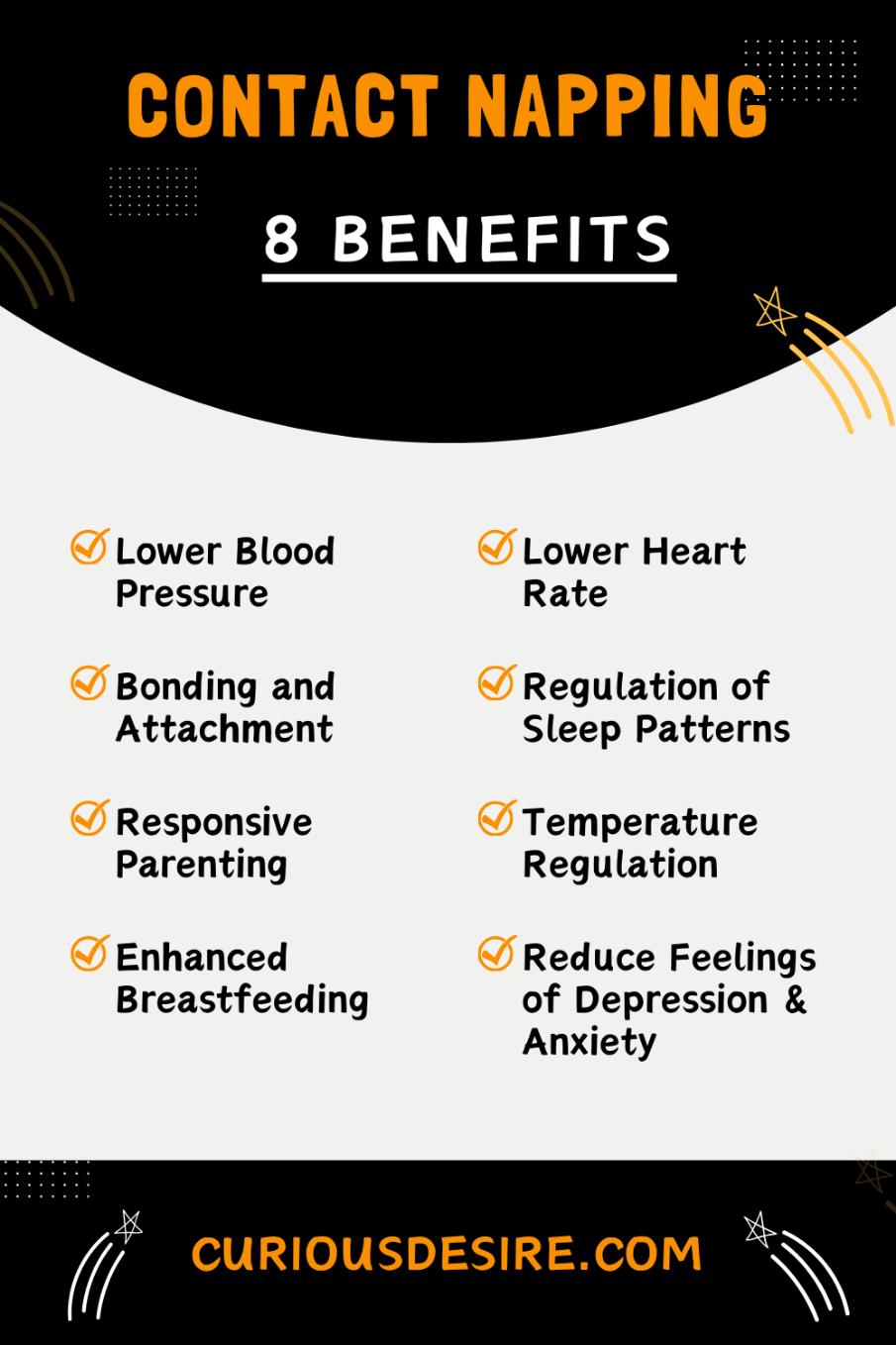The beautiful journey of parenthood is filled with countless moments to cherish, and one such precious experience is contact napping.
It goes beyond being just a cozy nap; it’s a tender hug that brings a host of positive outcomes for both the little one and the parent.
In this article, we’ll try to make this special moment even more special by sharing some benefits of contact napping.
Here are the top 4 benefits of contact napping:
- Regulation of Sleep Patterns
- Enhanced Breastfeeding
- Bonding and Attachment
- Reduce Feelings of Depression and Anxiety
[toc]

Benefit 1: Lower Blood Pressure
One amazing benefit of contact napping is that it can lower your blood pressure. When you hold your baby close, it triggers a release of oxytocin, often called the “love hormone.”
This hormone helps to bring down stress hormones like cortisol. As cortisol levels decrease, your body relaxes, and this can lead to a drop in blood pressure.
So, besides the joy of bonding, contact napping might be doing your heart a favor by keeping your blood pressure in check.
Benefit 2: Lower Heart Rate
When you cuddle with your baby during contact napping, it helps to slow down your heart rate. It’s like a natural way to feel calm and relaxed.
Holding your baby close activates the part of your nervous system that promotes relaxation, and that’s reflected in a lower heart rate.
So. there’s a physiological bonus that comes with contact napping – a slower heart rate for a more tranquil you.
Benefit 3: Bonding and Attachment
Contact napping is like a superpower for building a strong emotional bond with your baby.
When you hold your little one close, he gets a sense of attachment to the specific feel of your closeness that he wouldn’t find elsewhere.
It’s the magic ingredient that forms the foundation of a secure and loving connection that will stick with your child as they grow.
Benefit 4: Regulation of Sleep Patterns
Benefit 5: Responsive Parenting
Being responsive to your baby’s needs makes them feel safe and secure.
With contact napping, you’re right there when your baby needs you, whether it’s for a snack or just a comforting cuddle.
This responsiveness not only takes care of immediate needs but also builds a strong foundation of trust between you and your little one.
Benefit 6: Temperature Regulation
Babies can struggle with staying warm, especially newborns. That’s where contact napping comes in handy.
When you hold your baby close, your body provides a cozy and stable temperature environment.
It’s like a natural way to make sure your baby is snug and comfy, and that adds an extra layer of comfort to your special moments together.
Benefit 7: Enhanced Breastfeeding
For moms who breastfeed, contact napping is like a breastfeeding ally. Having your baby close makes breastfeeding more convenient and enjoyable.
It helps your baby get their meal easily, and you get to strengthen that special bond during feeding time.
The emotional connection you build during these moments can make breastfeeding a positive experience for both of you.
Benefit 8: Reduce Feelings of Depression and Anxiety
Parenting comes with its share of challenges, but contact napping can be a source of emotional support.
The emotional closeness and oxytocin release during these moments act as a shield against feelings of depression and anxiety.
So, while you’re making memories with your baby, you’re also boosting your emotional well-being.
Contact Napping Benefits FAQ
1. Is it OK to contact nap sometimes?
Contact napping, where a baby sleeps in close physical contact with a caregiver, is generally considered safe and even beneficial for infants.
It promotes bonding, regulates the baby’s temperature and breathing, and can enhance their sense of security.
However, it’s essential to strike a balance and encourage independent sleep as your baby grows.
2. When should I stop holding my baby to sleep?
As your baby develops, it’s advisable to gradually transition them to independent sleep.
Around 4-6 months, babies start developing self-soothing skills. While it’s okay to hold your baby until drowsy, encourage them to fall asleep in their crib.
This helps establish healthy sleep habits and promotes self-soothing abilities.
3. Should I let my baby sleep on me during the day?
Allowing your baby to nap on you during the day can be comforting and practical, especially during the early months.
However, as your baby grows, you might want to introduce naps in a crib or other designated sleep space.
This transition can help foster independent sleep and create a consistent nap routine.
4. What are the benefits of nap training?
Nap training can bring several benefits, including improved sleep quality, enhanced daytime alertness, and the development of a predictable nap schedule.
It helps babies learn to self-soothe and fall asleep independently, fostering better sleep habits that contribute to overall well-being.
5. What are the 3 benefits of napping?
- Increased Alertness: Short naps can boost alertness and performance, making them beneficial for both infants and adults.
- Memory Consolidation: Napping aids in consolidating and strengthening memories, supporting cognitive development.
- Mood Enhancement: Naps can have mood-regulating effects, reducing irritability and promoting a more positive emotional state.
6. Is it OK to take a 2-hour nap every day?
While occasional 2-hour naps are generally fine, daily long naps may interfere with nighttime sleep.
It’s essential to strike a balance and ensure that extended napping doesn’t disrupt your regular sleep schedule.
Consistency in sleep patterns contributes to overall sleep quality.
7. How long does it take for nap training to work?
The duration of nap training varies for each baby. It may take a few days to a few weeks for a consistent nap routine to develop.
Patience and consistency are key. Be attentive to your baby’s cues and adjust the training approach as needed to suit their individual needs.
8. Is nap training harder than sleep training?
Nap training can pose unique challenges, as daytime sleep is influenced by different factors than nighttime sleep.
However, the principles of consistency, routine, and gradual independence apply to both.
Some may find nap training a bit more challenging, but success often comes with patience and persistence.
9. Are naps good for development?
Yes, naps are crucial for development. They contribute to cognitive growth, emotional well-being, and overall health.
Naps provide the necessary downtime for the brain to process information, consolidate memories, and support optimal development, especially in infants and young children.
10. Does a 20-minute nap help?
Absolutely! A 20-minute nap, known as a power nap, can provide a quick boost in alertness and performance without causing sleep inertia (that groggy feeling after a longer nap).
It’s an effective way to combat fatigue and enhance productivity during the day.
